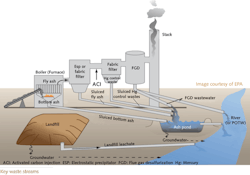Water, Wastewater Industry Makes Case for Exemption from CFATS Regulation
By Patrick Crow, Washington Correspondent
The drinking water and wastewater industries appear to be on track to keep their exemption from regulation under the federal Chemical Facility Anti-Terrorism Standards (CFATS) program.
The legislation will be considered by the House Energy and Commerce Committee, which previously has approved the exemption for water utilities, before advancing to the floor of the House of Representatives.
The Senate Homeland Security and Governmental Affairs Committee has yet to act on a similar bill this year, but like the House panel, it has approved a series of exceptions for operators of water and wastewater facilities in the past.
However, in recent sessions, Congress has enacted CFATS extensions by attaching language to annual appropriations bills. It appeared likely that expedience would be taken again this year.
Water associations have won the CFATS exemptions with the argument that they are adequately covered by Environmental Protection Agency rules under the Bioterrorism Act. They said additional regulation by the Department of Homeland Security (DHS) under the CFATS program could be redundant and lead to conflicts. And they emphasize that CFATS was tailored for the chemical industry and contains provisions inappropriate for drinking water and wastewater utilities.
The House committee passed the bill (H.R. 4007) to recodify and reauthorize CFATS by voice vote. Sponsored by Rep. Patrick Meehan (R-Pa.), the bill would continue the current structure of CFATS while authorizing $87.4 million per year for DHS to administer the program through 2017.
Bennie Thompson (D-Miss.), the senior Democrat on the committee, won the requirement for the new study. He said the drinking water/wastewater exemption creates a security gap that should be addressed somehow.
Under his amendment, DHS would commission an outside party to study any and all potential vulnerabilities to terrorism associated with the structure of CFATS. The committee understood that the report particularly would examine the implications of exempting water and wastewater facilities from program oversight.
Homeland Security Committee Chairman Michael McCaul (R-Texas) acquiesced to the amendment, explaining that it could result in additional information on the strengths and weaknesses of CFATS.
On the Senate side of Capitol Hill, drinking water advocates won some important changes to the Chemical Safety and Drinking Water Protection Act, introduced in reaction to the Kanawa River chemical spill last January.
Freedom Industries leaked 7,500 gallons of 4-methylcyclohexanemethanol (MCHM) into the Elk River, a Kanawa tributary, upstream from a water treatment plant serving the Charleston, W.Va., area. About 300,000 people lost potable tap water for about a week, but there were no apparent environmental damages (see "Protection Legislation Proposed in Light of West Virginia Spill,"March/April 2014).
The Senate Committee on Environment and Public Works easily passed the bill (S. 1961) in a bipartisan vote. The legislation was introduced by Sens. Joe Manchin (D-W.Va.), Jay Rockefeller (D-W.Va.) and Chairman Barbara Boxer (D-Calif.).
The bill would require regular state inspections of aboveground chemical storage facilities; mandate that industry develop state-approved emergency response plans that meet minimum guidelines; allow states to recoup costs incurred from responding to emergencies; and ensure drinking water systems have the tools and information to respond to emergencies.
The American Water Works Association (AWWA) and the Association of Metropolitan Water Agencies (AMWA) won several significant changes in the bill. It was amended to require that water utilities downstream of a potentially harmful spill be notified immediately. Also, procedures for communicating chemical inventory information to nearby water systems would be streamlined.
And the bill clarifies that a water utility's receipt of information about the chemicals inventories conferred no new responsibilities or liabilities: the utility would not be expected to file a Safe Drinking Water Act (SDWA) lawsuit against an upstream chemical facility that might pose a threat to water supplies.
AMWA said it would continue to seek additional requirements to more clearly define chemical storage facilities subject to the new state-implemented regulations and to allow water systems to recover costs they incur by responding to spills by chemical plants.
About the Author: Patrick Crow covered the U.S. Congress and federal agencies for 21 years as a reporter for industry magazines. He has reported on water issues for the past 15 years. Crow is now a Houston, Texas-based freelance writer.
Archived IWW Issues

